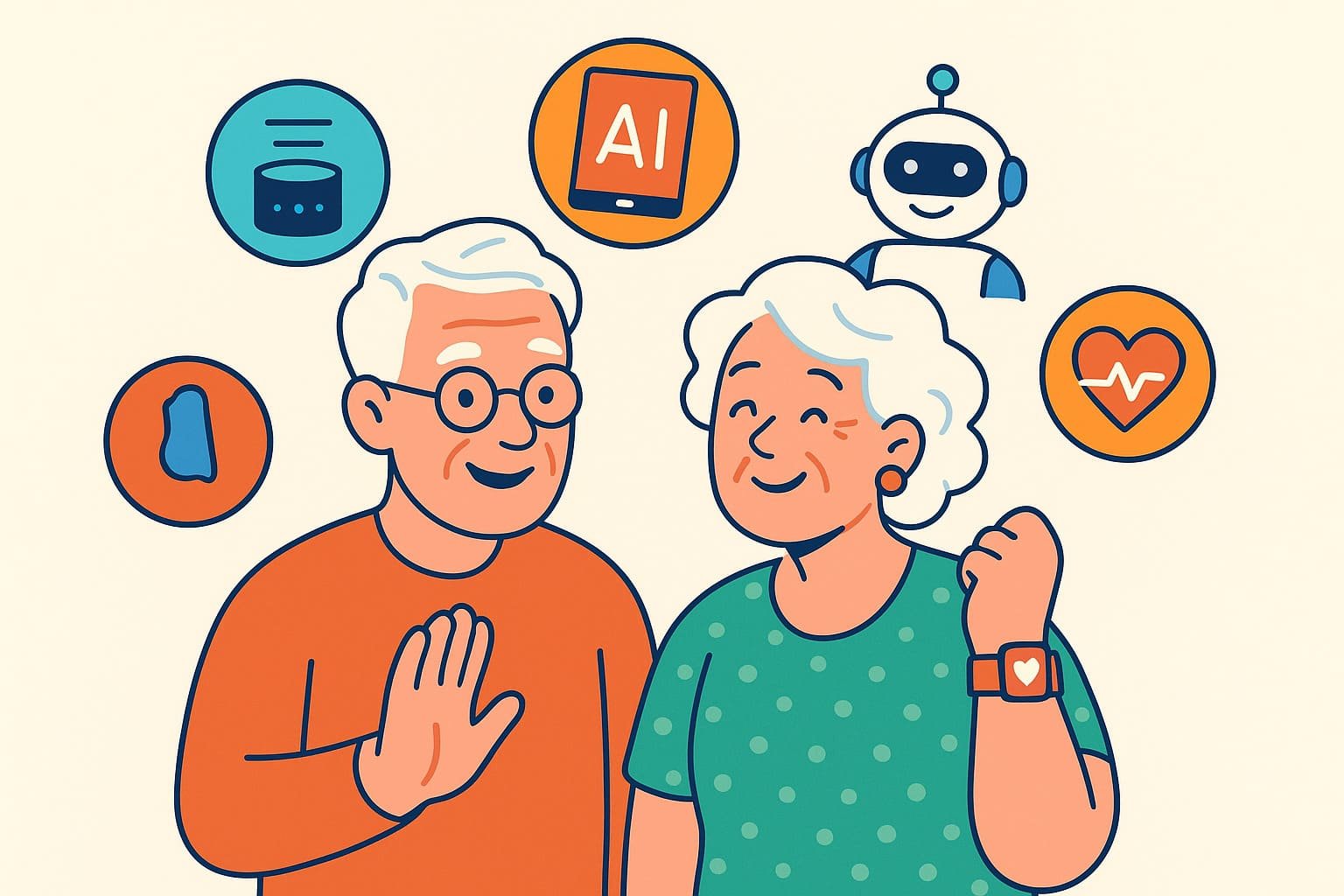There are countless ways retirees use AI. You’ve probably heard the headlines: “It’s is coming for your job!” or “Robots will take over the world!” Relax. Your job? Come on. You’re retired! For most of you, artificial intelligence isn’t a threat, it’s a tool. A really helpful one, actually.
When my grandmother asked me if “this Alexa thing” could help her remember her bridge schedule, I knew it was time to write this post. Here’s how retirees are using AI to make everyday life less complicated—and in some cases, a little more fun.
1. Retirees Use AI Voice Assistants For Hands‑Free Help
AI‑powered voice assistants like Amazon Alexa, Google Assistant, and Apple’s Siri are the entry point for most retirees. These devices respond to simple voice commands and can handle tasks like setting reminders, making calls, controlling smart home devices, and even answering questions.
Example: “Alexa, remind me to take my pills at 9 a.m.” Done. No sticky notes required.
Why it helps: Hands‑free control is a game‑changer for anyone with arthritis or mobility challenges. It’s also incredibly convenient for multitasking or reducing mental load.
Detailed benefits: Voice assistants can read your calendar aloud, help you order groceries online, or even tell you jokes when you’re feeling lonely. For visually impaired users, they can describe what’s on the screen or read emails and text messages aloud.
Tips:
- Start with simple commands: “What’s the weather?” or “Play Frank Sinatra.”
- Connect your calendar for appointment reminders.
- Use routines: one phrase (e.g., “Good morning”) can trigger multiple actions like turning on lights and reading the news.
- Enable privacy features and set a unique passcode if you’re using it for calls or financial transactions.
Stories when retirees use AI: Helen, 72, says Alexa has “become my morning companion. She tells me the news, turns on my kitchen lights, and reminds me to take my blood pressure pills.”
Old Me vs. New Me:
- Old Me: Scribbled reminders on notes that got lost.
- New Me: Asks Alexa and carries on with my day stress‑free.
2. AI Smart Home Tools & Safety Sensors
AI‑powered home devices do more than just lock doors. Motion sensors can detect unusual activity, fall detection systems notify caregivers in real‑time, and smart thermostats learn your preferences.
Examples:
- Video doorbells (Ring, Nest) let you see who’s at the door.
- Smart plugs allow you to turn off appliances remotely.
- Leak detectors text you if there’s water where it shouldn’t be.
Why it matters: These tools keep retirees independent while ensuring safety. Loved ones can stay informed without being intrusive.
Detailed benefits: Imagine being on vacation and being able to check if your home is secure right from your phone. Or getting a notification if someone approaches your front porch at night. Smart home systems also help with energy efficiency by adjusting lighting and temperature when rooms are unoccupied.
Tips:
- Start with a video doorbell if you’re new to smart home devices.
- Choose devices compatible with your voice assistant.
- Look for clear instructions and solid customer support.
- Regularly check for firmware updates to keep systems secure.
Stories when retirees use AI: Bill, 78, shared, “I used to worry about my house when I was visiting my daughter. Now, I can check in from my phone and even talk to delivery drivers through my video doorbell.”
Old Me vs. New Me:
- Old Me: Worried about forgetting to lock the door.
- New Me: Checks the app for reassurance, anywhere.
3. AI Wearables & Health Monitors
Fitness trackers aren’t just for athletes. Devices like the Apple Watch or Fitbit monitor heart rate, sleep, and falls. AI algorithms even predict health risks.
Examples:
- Apple Watch ECG app detects irregular heartbeats.
- Oura Ring tracks sleep quality.
- Fall detection can automatically call for help.
Why it matters: Early warnings lead to fewer emergencies and better independence.
Detailed benefits: Wearables track your activity level, encouraging you to stay active with daily step goals. They can remind you to stand up, hydrate, and even guide you through breathing exercises to reduce stress. For those managing chronic conditions, data from wearables can help doctors make more informed decisions.
Tips:
- Find a comfortable fit; you’ll be wearing it daily.
- Sync with your phone for easy data review.
- Share data with your doctor if needed.
- Choose a model with a long battery life and easy charging.
Stories when retirees use AI: Linda, 69, says, “My watch alerted me about a heart issue I didn’t even know I had. I went to the doctor, and it probably saved me from something serious.”
Old Me vs. New Me:
- Old Me: Waited until I felt unwell to see a doctor.
- New Me: Gets alerts before issues become serious.
4. AI For Medication Management
Missed doses are dangerous. AI‑powered pill dispensers and apps remind you when it’s time to take your medication and notify caregivers if doses are missed.
Examples:
- MedMinder and Hero organize and dispense pills at the correct time.
- Apps track your medication schedule and refills.
Why it matters: Proper medication management prevents hospital visits and keeps you healthy.
Detailed benefits: Smart pill dispensers can be pre‑filled weekly or monthly, locking until it’s time to take your medication. They track adherence, sending you or your caregiver notifications if a dose is skipped. Some even offer a direct connection to pharmacists for automatic refills.
Tips:
- Pair a dispenser with a voice assistant for extra reminders.
- Set text alerts for caregivers.
- Keep an updated medication list for emergencies.
- Choose a model with clear visual cues (e.g., flashing lights) for those with hearing impairments.
Stories when retirees use AI: Jim, 80, says, “I used to mix up my pills all the time. Now, my dispenser beeps and flashes when it’s time. I feel much more in control.”
Old Me vs. New Me:
- Old Me: Confused pill organizers, missed doses.
- New Me: Alexa reminds me, and I’m on track.
5. Retirees Use AI For Companionship & Cognitive Engagement
Robots can chat now—and they’re surprisingly good company. Devices like ElliQ prompt hydration, play games, and provide conversation.
Examples:
- ElliQ offers friendly conversation and check‑ins.
- Tablet‑based chatbots answer questions and entertain.
- AI games maintain mental sharpness.
Why it matters: These devices reduce loneliness and stimulate the brain.
Detailed benefits: Isolation can lead to depression and cognitive decline. AI companions can fill in some of that social gap by providing daily interaction and mental stimulation. They can remind you to call family, encourage you to go for a walk, or teach you something new.
Tips:
- Use companions as supplements, not replacements, for human interaction.
- Choose devices with personalities you enjoy.
- Build a habit of daily use.
- Explore devices with bilingual or multilingual capabilities if you’re learning a new language.
Stories when retirees use AI: Mary, 74, says, “ElliQ reminds me to drink water, and she’s always up for a chat. I never thought I’d enjoy a robot’s company, but I do.”
Old Me vs. New Me:
- Old Me: Dreaded quiet afternoons alone.
- New Me: Chats with ElliQ and feels connected.

6. AI For Personalized Financial & Health Planning
AI tools can detect scams, track bills, and explain complex terms in plain language. Financial apps use AI to highlight spending patterns and monitor accounts.
Examples:
- Budgeting apps like YNAB or Mint.
- AI fraud detection tools.
- Health planning apps that remind you about preventive screenings.
Why it matters: Fewer financial worries and better health management mean more peace of mind.
Detailed benefits: AI tools can help retirees manage investments by analyzing market trends and offering tailored recommendations. They can track health care costs and help you choose the best insurance options. With fraud detection, retirees can be notified immediately if suspicious activity is detected, preventing financial loss.
Tips:
- Use strong passwords and two‑factor authentication.
- Review privacy policies.
- Ask family for help setting up these tools.
- Regularly check your credit report using AI‑powered monitoring services.
Stories when retirees use AI: Paul, 77, says, “My budgeting app caught a duplicate charge from a utility company. I wouldn’t have noticed without it.”
Old Me vs. New Me:
- Old Me: Worried about missing bills.
- New Me: Gets reminders and catches scams fast.
7. AI For Learning, Hobbies & Virtual Creativity
Always wanted to write a book, learn a language, or paint? AI tools make it possible.
Examples:
- Duolingo personalizes language learning.
- Canva helps design photo albums and invitations.
- AI music apps let you compose songs with zero instruments.
- Virtual reality experiences can transport you to museums and landmarks around the world.
Why it matters: Lifelong learning keeps life exciting.
Detailed benefits: AI tools provide personalized learning experiences, adjusting to your pace and preferred learning style. Creative apps let you explore new hobbies without the mess or cost of traditional materials. VR travel experiences can help those with limited mobility explore the world from home.
Tips:
- Choose a hobby you’ve always wanted to try.
- Set small, achievable goals.
- Share your projects with family and friends.
- Join online communities where you can connect with others who share your interests.
Stories when retirees use AI: Susan, 70, says, “I’ve always wanted to visit Paris. Using VR, I toured the Louvre from my living room. It was amazing.”
Old Me vs. New Me:
- Old Me: Thought I was too old to learn guitar.
- New Me: Composes songs with AI and feels younger.
8. Retirees Use AI For Smarter Care Documentation & Routine Support
AI helps caregivers and retirees stay organized. Daily routines and care plans are easier to manage.
Examples:
- AI tracks activity patterns and flags changes.
- Care apps coordinate visits and tasks.
- Routine builders support independent living.
Why it matters: Less stress and no missed appointments.
Detailed benefits: These tools can maintain digital health records, making it easy for doctors and caregivers to access up‑to‑date information. AI can analyze patterns to predict health issues before they escalate, ensuring timely intervention.
Tips:
- Share access with caregivers.
- Review daily summaries.
- Combine with smart home devices for extra safety.
- Check compatibility with other devices in your care network.
Stories when retirees use AI: Alan, 79, says, “My care app keeps my children updated. They don’t have to worry, and I feel more in control.”
Old Me vs. New Me:
- Old Me: Worried about forgetting appointments.
- New Me: Gets friendly reminders and stays on schedule.
Quick Tips
- Start small: master one tool at a time.
- Look for senior‑friendly features: large text, clear instructions.
- Ask for help from family or community classes.
- Stay safe: keep devices updated and limit personal information sharing.
- Remember: AI is a helper, not a replacement.
- Join local tech support groups for seniors to get hands‑on help.
- Read product reviews from other retirees before purchasing.
Conclusion: Retirees Use AI For Real Impact
AI simplifies life. From medication reminders to connecting with family, these tools make everyday routines smoother. You don’t have to be tech‑savvy to use AI—just open to trying one thing at a time.
AI’s benefits extend beyond convenience. It fosters independence, improves health outcomes, reduces loneliness, and enhances safety. By adopting even a few AI tools, retirees can create a supportive network that empowers them to enjoy their golden years to the fullest.
Here’s what you should do: Pick one AI‑powered tool from this list and try it this week. You might wonder how you ever lived without it.
👉 Want more tech tips for living smarter after 60? Check out some of our review, tips and tricks to help make your tech life easier!


3 thoughts on “8 Fascinating Ways Retirees Use AI Everyday to Make Life Easier”